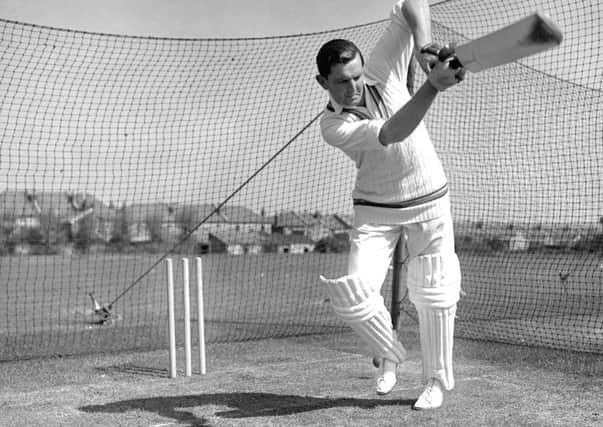Obituary: Tom Graveney OBE, cricketer


Tom Graveney was the last survivor of Len Hutton’s team that regained the Ashes in 1953. On the second afternoon of that year’s Lord’s Test, in partnership with Hutton, the young Graveney scored a brilliant 78 not out. It might have been more but Hutton told him to slow down, make sure he was still there tomorrow. The next morning Ray Lindwall clean bowled him in the first over. This epitomised the first part of his career. “Brilliant but unsound,” some said, “no Test match temperament.” In fact Lindwall , the best fast bowler in the world then, had dismissed him with brute of a ball, a late in-swinging yorker. Nevertheless, the distrust persisted. Between 1951 and 1966 Graveney was out of the Test team as often as he was in it.
He was a delight to watch, a tall man who played with a full swing of the bat. His cover drive was sheer perfection, and he hooked even the fastest bowlers off the front foot.
Advertisement
Hide AdAdvertisement
Hide AdEverything he did was elegant, and he made batting look the most natural thing in the world. Paradoxically, the very ease with which he seemed to play made criticism sharper when he failed.
Yet he wasn’t by any means only a fair-weather batsman. Jimmy Allan, who played for Oxford University and Kent and was the greatest Scottish cricketer of his generation, once told me that Graveney was the best English batsman on bad wickets that he had bowled to.
Figures speak for themselves. No one without mental toughness could play first-class cricket for more than 20 years, scoring 44,793 runs at an average of 44.91. Of players who began their career after 1945 only Geoffrey Boycott has scored more. Graveney hit 122 centuries.
In 79 Test matches he scored 4,882 runs, at an average of 44.38, with 11 hundreds. Players today comfortably surpass his Test figures, but then many more Test matches are played. Moreover, in the middle part of his career Graveney appeared in only seven Tests, between March 1959 and June 1966.
This was not entirely due to selectorial distrust or caprice. Graveney had captained his county, Gloucestershire, for two quite successful seasons when he was suddenly dismissed and replaced by an Old Etonian with little experience of first-class cricket, and of no great ability.
Understandably disgruntled, Graveney chose to leave the county. Gloucestershire held on to his registration, and, according to the regulations of the time, he had to spend a year qualifying for his new county, Worcestershire, playing only Second XI cricket.
There was, however, a happy ending. The fast Worcester wicket suited his front-foot style, and he blossomed again.
In 1966 he was at last recalled to the England team to play the West Indies at Lord’s. Against a powerful attack (Wes Hall, Charlie Griffiths, Gary Sobers and Lance Gibbs) he made 96, and followed it with centuries at Trent Bridge and The Oval where his 165, perhaps his finest Test innings, turned the match in England’s favour.
Advertisement
Hide AdAdvertisement
Hide AdHe was 39 now, but batting as well as he had ever done. Indeed, five of his Test hundreds (and another 96, against Australia) were made after his 39th birthday.
His Test career ended suddenly in 1969. Sundays were a rest-day then, and on the Sunday of a Test against the West Indies, in which he had scored 75, he played in a charity exhibition match. Professional cricketers were not well paid then, and he could ill afford to turn down the promised appearance fee, which, at £1,000, was some eight times higher than his Test Match one. The chairman of selectors, Alec Bedser, was displeased. Graveney was suspended for three Tests, and that was it. He still scored freely in county cricket, averaging more than 60 in 1970, second only in the national averages to Gary Sobers.
Anyone who watched Graveney bat is likely to retain a vivid mental picture of his style, even half a century on. For those too young, I would suggest that they imagine a taller Ian Bell.
Like Bell, he seemed to caress the ball through the covers rather than hitting it hard; but it still flew from the bat. Timing is all. If the England selectors sometimes failed to appreciate him, opponents didn’t.
The great West Indian captain, Frank Worrell, himself a batsman of seemingly languid ease, would ask: “Is Tom in the England side?” and be relieved if he wasn’t.
Though he was associated with the West Country, he was a northerner by birth, moving to Bristol only when his mother’s second husband took a job there.
Graveney went to Bristol Grammar School and grew up watching and idolising the great Walter Hammond. When he came into the Gloucestershire side he was seen, fairly, as a second Hammond.
During his national service he received a commission in the Gloucesters, and was tempted to remain in the army as a regular.
Advertisement
Hide AdAdvertisement
Hide AdHappily, his brother Ken, a fast-medium bowler already on the Gloucestershire staff, recommended him to the county, saying: “I can’t get a ball past him”, and so cricket won.
Indeed, cricket was the winner, whenever Tom Graveney was at the wicket. No English batsman, not even David Gower, has given me more pleasure
After he retired Graveney became a successful TV commentator. He was appointed OBE in 1968, and in 2004 became the first professional cricketer to be elected president of the MCC.
His brother Ken also captained the county, and died only a few days before Tom. Graveney’s wife, Jackie Brookman pre-deceased him. He is survived by a son and daughter.